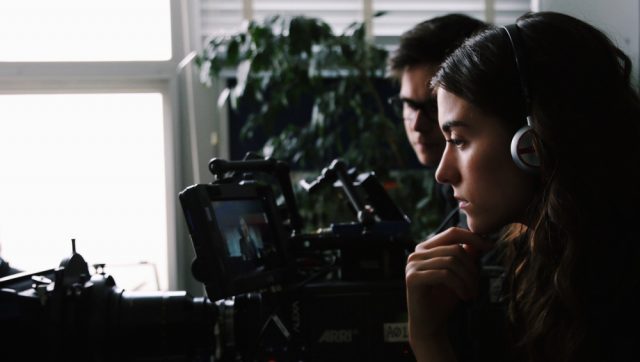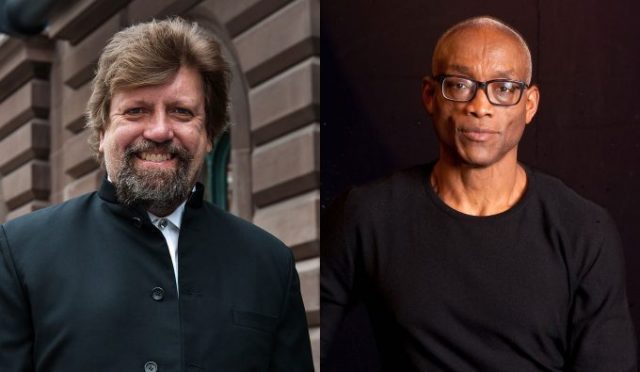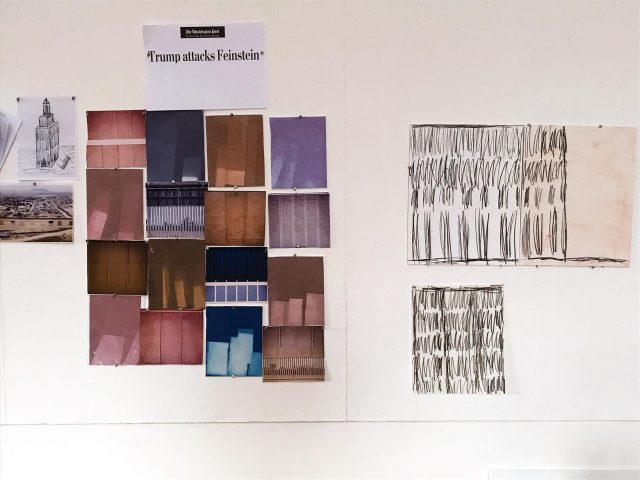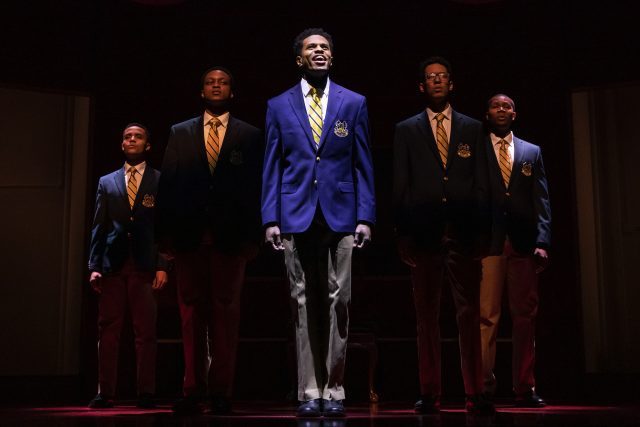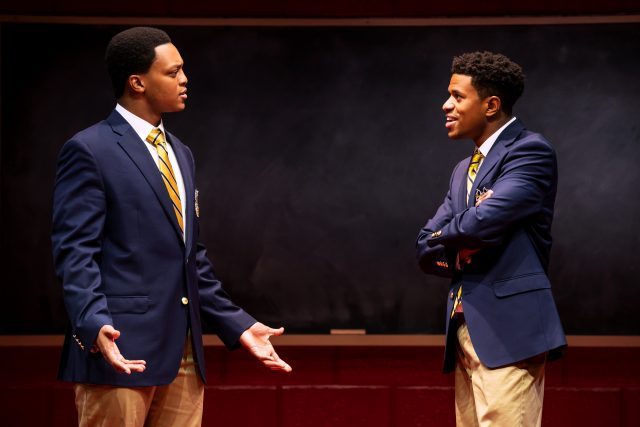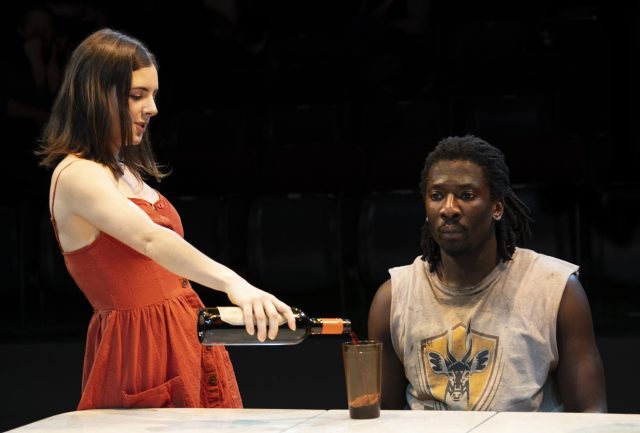
Julie (Elise Kibler) tempts John (James Udom) with more than just wine in Mies Julie (photo by Joan Marcus)
Classic Stage Company, Lynn F. Angelson Theater
136 East 13th St. between Third & Fourth Aves.
Tuesday – Sunday through March 10, $82-$127
www.classicstage.org
Classic Stage Company gives Swedish playwright August Strindberg a decidedly twenty-first-century edge in adaptations of Mies Julie and The Dance of Death, which opened last night and continue through March 10 in repertory, both shedding light on seemingly impossible relationships. South African writer and director Yaël Farber moves Strindberg’s 1888 naturalistic Miss Julie to Freedom Day in her native country in 2012, an annual holiday celebrating the 1994 post-Apartheid expansion of voting rights to all adult South Africans, regardless of race or gender. Freedom might have come to the nation, but John (James Udom) and his mother, Christine (Vinie Burrows), have nothing, sharecropping on a farm owned by a wealthy Afrikaner family. Julie (Elise Kibler), the farmer’s daughter, is attending a fancy party but prefers to hang out with John, teasing him with sexual come-ons that both titillate and frighten him: He is well aware of the consequences if he is caught so much as touching her. “Don’t test me, Mies Julie. I’m only a man,” he tells her. When she doesn’t back away, he adds, “This is just a game to you. But my mum and I — we have nowhere else to go. She was born on this farm. Her sweat is in these walls. Her blood — in this floor. Now I must risk everything. Because you’re drunk and bored tonight.”
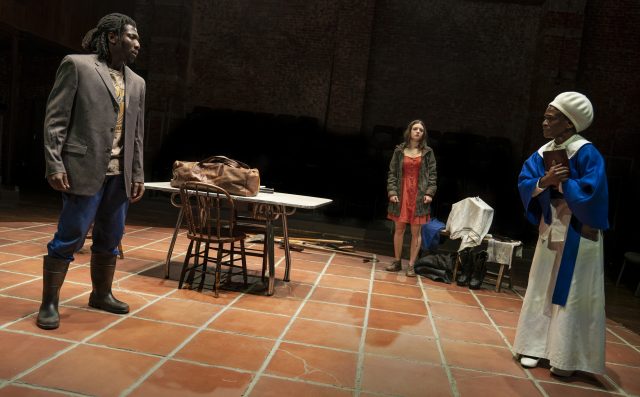
Christine (Vinie Burrows) clutches her Bible as her son (James Udom) and Julie (Elise Kibler) look on in Classic Stage production (photo by Joan Marcus)
The stakes are high for John and his black coworkers, who live in a squatters’ shack on the farm. Meanwhile, the tiny, hunched, elderly Christine performs her chores dutifully, but she is ever mindful of her heritage and those who came before, several of whom are buried under the kitchen and the surrounding acreage, including Ukhokho (Patrice Johnson Chevannes), who occasionally walks through the room, a reminder of their ancestors and their connection to the land that was once theirs. (Farber subtitles the play Restitutions of Body & Soil since the Bantu Land Act No. 27 of 1913 & the Immorality Act No. 5 of 1927.) Referring to a tree just outside, Christine says to her son, “We planted it over your great grandmother’s grave. And under the roots likes Ukhokho. This tree saps from her bones. Your great grandmother won’t let me sleep until I free them from beneath. . . . They can cover what they’ve done but the roots keep breaking through. These roots will never go away. Never. Ever. Go away.” The roots might never go away, but John and Julie have some tough choices to make after an unpredictable evening.
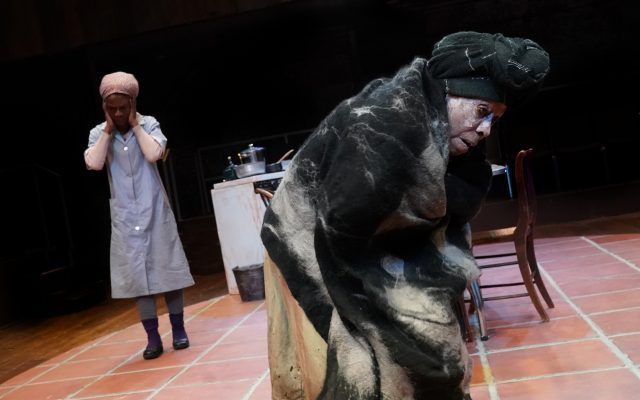
Christine (Vinie Burrows) is haunted by an ancestor (Patrice Johnson Chevannes) in Strindberg play relocated to South Africa (photo by Joan Marcus)
Mies Julie is a razor-sharp examination of race and power; it might take place in South Africa in 2012, but it just as easily could be set any time in post–Civil War America, including today. There is nothing in the play or in David L. Arsenault’s design — a simple kitchen on a tiled oval platform, a ceiling fan rotating slowly above — that identifies a specific time. Udom (Father Comes Home from the Wars, The Revolving Cycles Truly and Steadily Roll’d) is fierce as John; when he declares, “I’m not going to spend my life cleaning your father’s boots,” you believe him to his core, even though there might be no way out for him. Kibler (London Wall, Indian Summer) knows just how to flaunt Julie’s privilege, an ingenue in a striking red dress who doesn’t quite understand the depth of her power. Farber (Nirbhaya, Salomé) and Afropolitan director Shariffa Ali (The Year of the Bicycle, We Are Proud to Present) keep the heat up through a fiercely tense seventy-five minutes that takes Strindberg’s original apart and puts it together in a whole new way.
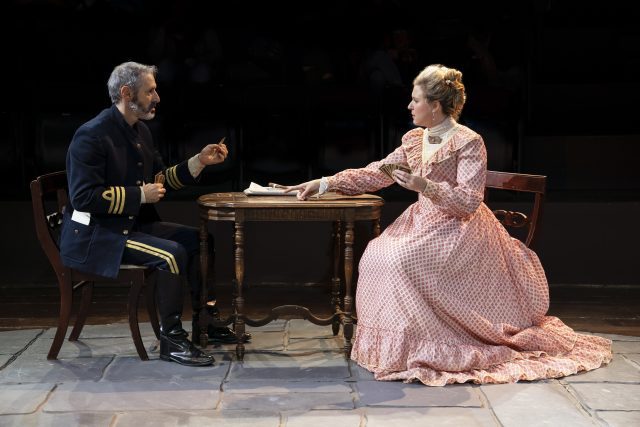
Edgar (Richard Topol) and Alice (Cassie Beck) have trouble communicating after twenty-five years of marriage in The Dance of Death (photo by Joan Marcus)
Irish playwright and filmmaker Conor McPherson (The Weir, Shining City) explores another problematic relationship in his seriocomic 2012 adaptation of Strindberg’s The Dance of Death. Edgar (Richard Topol) is a bitter and paranoid military captain exiled to a coastal fortress. Alice (Cassie Beck) is a former actress whose dreams of fame still linger. It’s 1900, and they’ve been married for twenty-five years, but they hate each other and life itself. “You see, what you do is, you take a mackerel, grill it, drizzle a little lemon on it, serve it up with a huge glass of white zinfandel — and one doesn’t feel quite like blowing one’s brains out anymore, does one?” Edgar says. “You’re asking the wrong person,” Alice responds. There’s an important party going on nearby at the doctor’s house, but Edgar and Alice are not on the guest list. When Alice taunts him, he states, “Do you want to know why I wasn’t invited? Shall I tell you? Because I refuse to mix with that scum – and because they all know I’m not afraid to speak my mind, that’s why.” Expecting her cousin Kurt (Christopher Innvar), the newly appointed quarantine master who introduced them to each other, to stop by, Alice says, “Well, he did bring us together.” Edgar replies, “He certainly did! And what a match!” Alice laughs and Edgar adds, “You may laugh. It’s me that’s had to live with it!” She responds, “And me!” Their jabs only get worse upon Kurt’s arrival, as they never miss an opportunity to attack. Edgar makes Kurt, who has plenty of his own personal baggage, a target as well, as they all talk about life and death and loneliness.
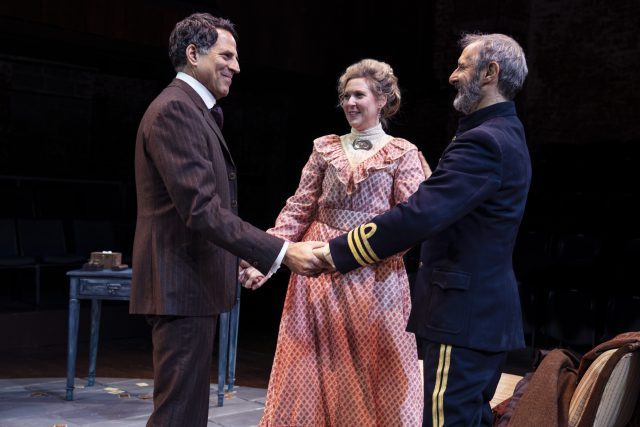
Kurt (Christopher Innvar), Alice (Cassie Beck), and Edgar (Richard Topol) share a brief smile in Conor McPherson adaptation at Classic Stage (photo by Joan Marcus)
Director Victoria Clark (Newton’s Cradle, The Trouble with Doug) emphasizes the more comic aspects of the story, making Edgar and Alice look more and more ridiculous as Alice fires the maid and Edgar warbles on about the manual he wrote. They are both haunted by what could have been. A photograph of Alice in her acting days hangs over them like a grim reminder (she was based on the first of Strindberg’s three wives, actress Siri von Essen), and occasionally she sits down at an imaginary piano and plays music that can be heard. Their inability to communicate extends to Edgar’s distrust of the telephone; instead, he has a telegraph that he uses to correspond with the outside world via Morse code. As with Mies Julie, Arsenault’s set design is relatively basic, with some furniture on the same oval platform, the audience again sitting on all four sides. The black comedy, which has influenced such other works with bickering couples as Edward Albee’s Who’s Afraid of Virginia Woolf? and John Guare’s The House of Blue Leaves, is too long at nearly two hours without intermission and occasionally gets tiresome with repetition, but Topol (Indecent, The Normal Heart) and Beck (The Humans, The Whale) hold nothing back in roles that have been previously performed onstage and -screen by such pairs as Robert Shaw and Zoe Caldwell, Ian McKellen and Helen Mirren, Paul Verhoeven and Lilli Palmer, and Laurence Olivier and Geraldine McEwan, with Innvar (’Tis Pity She’s a Whore, Big Love) adding the appropriate sleaziness as Kurt. “Life is terrible,” Edgar says to Kurt. “I could never understand people like you. People who actually want more life, some in eternal hereafter. More life! Why?” As both Mies Julie and The Dance of Death reveal at Classic Stage, it’s hard to want more life when love can be so difficult.
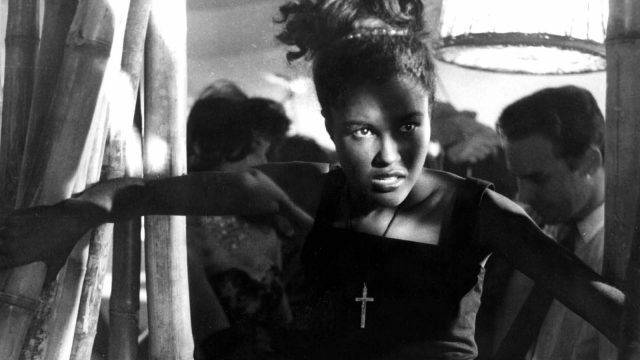
 The Revivals section of last year’s New York Film Festival included a rare screening of Mikhail Kalatozov’s 1964 political epic, I Am Cuba, in a 4K restoration from Milestone. It’s now back for a one-week run beginning at Film Forum on February 15. In the early 1960s, the Soviet Union wanted to cement its hold on Cuba and celebrate its new Communist regime by making a propaganda film celebrating the Cuban Revolution and the end of Fulgencio Batista’s dictatorial reign. The Soviets actually disowned the result, considering it too arty and inaccessible for their needs. But it’s quite a film, a lavishly photographed black-and-white gem that was championed by Martin Scorsese and Francis Ford Coppola when it was resurrected at the Telluride Film Festival in 1992.
The Revivals section of last year’s New York Film Festival included a rare screening of Mikhail Kalatozov’s 1964 political epic, I Am Cuba, in a 4K restoration from Milestone. It’s now back for a one-week run beginning at Film Forum on February 15. In the early 1960s, the Soviet Union wanted to cement its hold on Cuba and celebrate its new Communist regime by making a propaganda film celebrating the Cuban Revolution and the end of Fulgencio Batista’s dictatorial reign. The Soviets actually disowned the result, considering it too arty and inaccessible for their needs. But it’s quite a film, a lavishly photographed black-and-white gem that was championed by Martin Scorsese and Francis Ford Coppola when it was resurrected at the Telluride Film Festival in 1992. 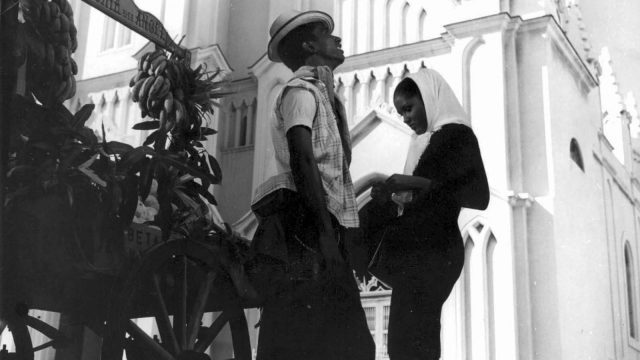
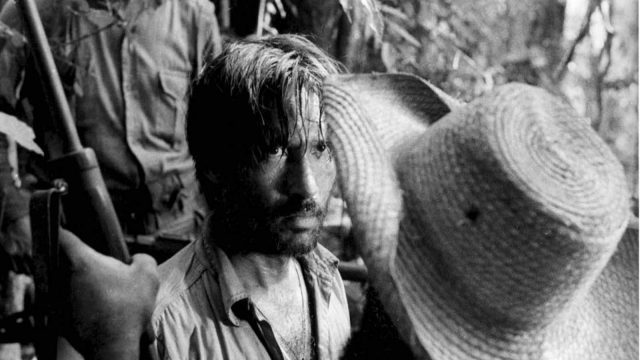





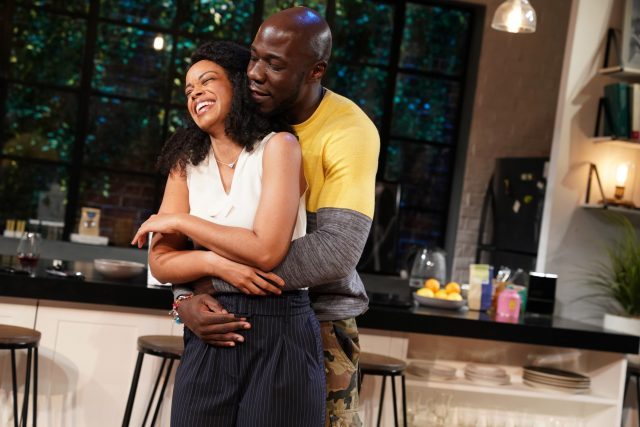
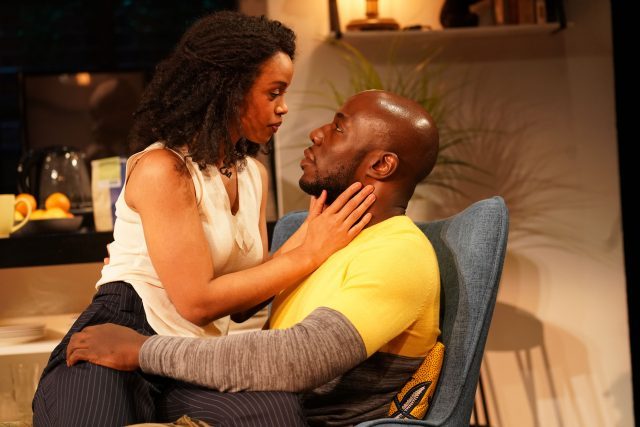
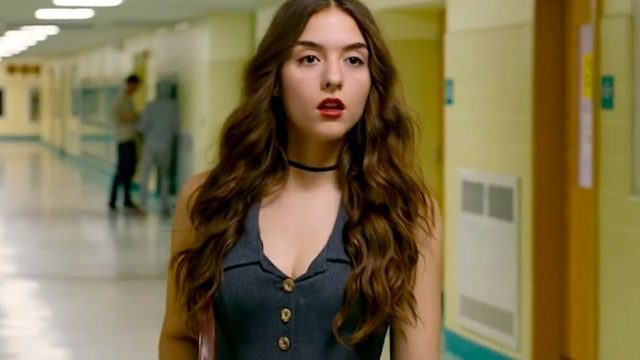
 Last summer, MoMA presented “The Future Is Female,” a week of independent features and shorts written, directed, and starring women, dealing with important issues of inclusivity and gender. The series is back for its second iteration, running February 14-21 and beginning with a recent head spinner. Twenty-two-year-old
Last summer, MoMA presented “The Future Is Female,” a week of independent features and shorts written, directed, and starring women, dealing with important issues of inclusivity and gender. The series is back for its second iteration, running February 14-21 and beginning with a recent head spinner. Twenty-two-year-old 